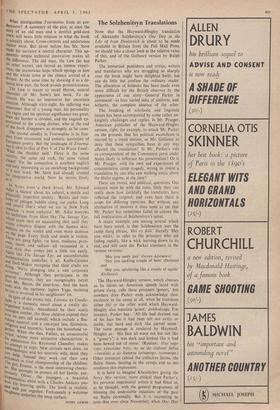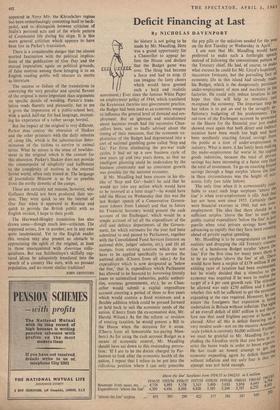The Solzhenitsyn Translations
Now that the Hayward-Hingley translation of Alexander Solzhenitsyn's One Day in the Life of Ivan Denisovich is about to be made available in Britain from the Pall Mall Press, we should take a closer look at the relative value of this, and of the Gollanez version by Ralph Parker.
The embattled publishers and critics, writers and translators who are struggling so sharply over the book might have delighted Swift, but can do little but confuse the ordinary reader. The allocation of honours has been made even more difficult for the British observer by the appearance of one army—General Parker in command—in four varied suits of uniform, and, hitherto, the complete absence of the other.
The breaking of scholastic and linguistic lances has been accompanied by some rather un- knightly challenges and replies. Is Mr. Praeger, American publisher of the Hayward-Hingley version, right, for example, to attack Mr. Parker on the grounds that his political escutcheon is marred by a trend sinister, or Mr. Gollancz to deny that these sympathies have in any way affected the translation? Is Mr. Parkefs role as correspondent of the Communist press under Stalin likely to influence his presentation? Or is Mr. Praeger, with his own sad experiences of concentration camp tragedy, wrong to resent a translation by one who saw nothing amiss about the Stalin regime, at the time?
These are moral, and political, questions. Our concern must be with the texts. Only they can really show how faithfully the translators have reflected the original, and even here there is scope for differing opinions. But without any attribution of motives it does seem to me that Mr. Parker has sometimes failed to convey the full implications of Solzhenitsyn's novel.
A major example, one among several which have been noted, is that Solzhenitsyn uses the camp slang phrase, 'Nei vy flail,' literally 'Hey you wicks,' to refer to the prisoners who are fading rapidly, like a wick burning down to its end, and will soon die. Parker translates in the various versions:
'Hey you seedy pair' (Soviet Literature) 'Hey you cackling couple of hens' (Duttons) and
'Hey you, spluttering like a couple of squibs' (Gollanci).
The Hayward-Hingley version, which chooses as its idiom an American speech laced with prison slang, calls these prisoners 'goners,' but nowhere does Parker even acknowledge their existence in the camp at all, when he translates either fitil or the other word which Hayward- Hingley also translate 'goner,' dokhotlyaga. For instance, Parker has: 'All life had drained out of his face but it had been left not sickly or feeble, but hard and dark like carved stone.' The same passage is rendered by Hayward- Hingley as: 'His face all worn out but not like a "goner's"; it was dark and looked like it had been hewed out of stone.' (Russian: litso yego vsyo vymotano bylo, no tie do slabosti Maya —invalida a do kamnya tyosanogo, tyomnogo.) Other instances (about the collective farms, the Baltic States, beating in the camps and so on) reinforce this impression.
It is hard to imagine Khrushchev giving the Novy Mir version, more critical than Parker's, his personal imprimatur unless it had fitted in, as he thought, with the general programme of blaming the undeniable injustices of the past on Stalin personally. But it is interesting to note that ever since November, when One Day appeared in Navy Mir, the Khrushchev regime has been embarrassingly contorting itself to back- pedal, and to distinguish between criticism of Stalin's personal acts and of the whole pattern of Communist life during his reign. It is this more general criticism which appears to have been lost in Parker's translation.
There is a considerable danger that the almost morbid fascination with the political implica- tions of the publication of One Day and the mutual imputation, again on political grounds, of false motives among those bringing it to an English reading public will obscure its merits as literature.
The success or failure of the translations in conveying the very peculiar and special flavour of the original is more important than arguments on specific details of wording. Parker's trans- lation reads fluently and pleasantly, but to me it gives the impression of a public-school boy, with a quick half-ear for bad language, recount- ing his experience of a rather savage borstal.
But the impact of the original is very different. Parker does convey the obsession of Shukov and the other prisoners with the daily minutix of camp life, which is the subconscious deter- mination of the victims to survive in animal terms. What he misses is the sense of bewilder- ment in the original which is the context for this obsession. Parker's Shukov does not provide the counterpoint of simplicity and bafflement to the complexity of motives in the external Soviet world, often only hinted at. The language of journalistic Moscow is as far as possible from the earthy demotic of the camps.
These are certainly not reasons, however, why Gollancz should not have produced their ver- sion. They were quick to see the interest of One Day when it appeared in Russian and quick to provide the British public with an English version, I hope to their profit.
The Hayward-Hingley translation has also drawn some—though much less—criticism. The supposed errors, few in number, are in any case quite insubstantial. Yet to the English reader this version may also present an obstacle to appreciating the spirit of the original, at least to those unacquainted with American collo- quialisms. But can Solzhenitsyn's skilfully cap- tured idiom be adequately translated into the speech of a country like ours, with no peasant population, and no recent similar tradition?
JOHN GRIFFITHS



































 Previous page
Previous page